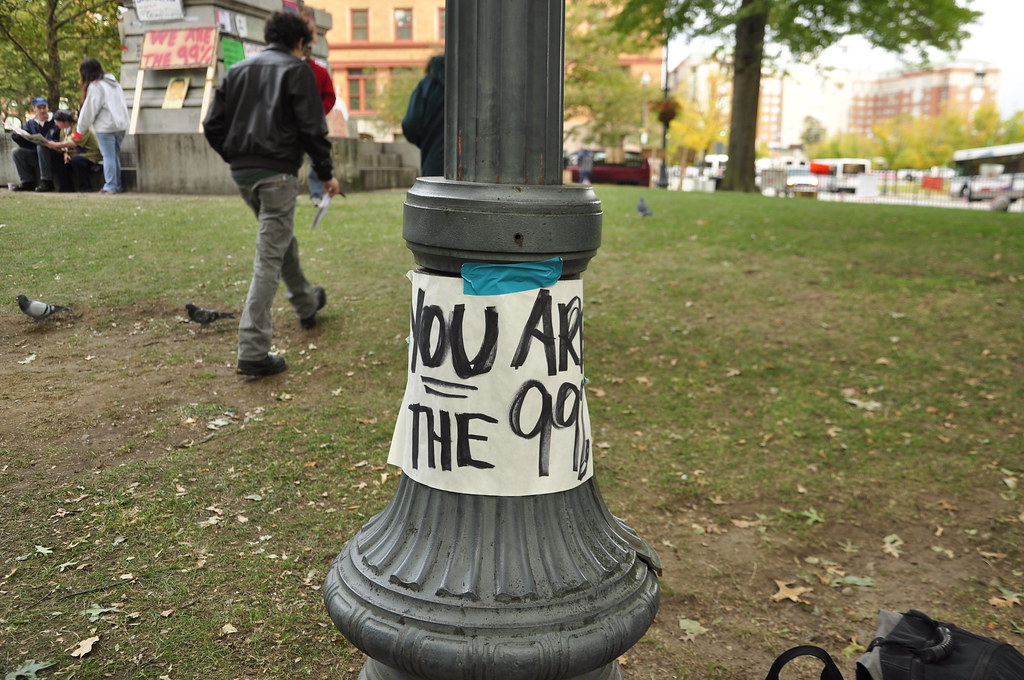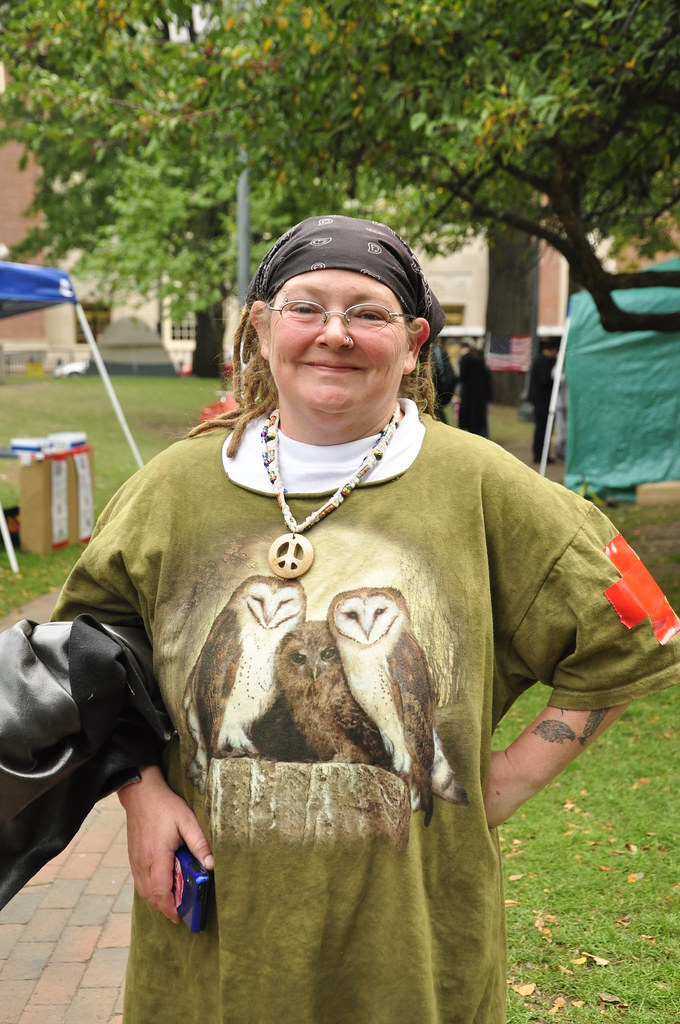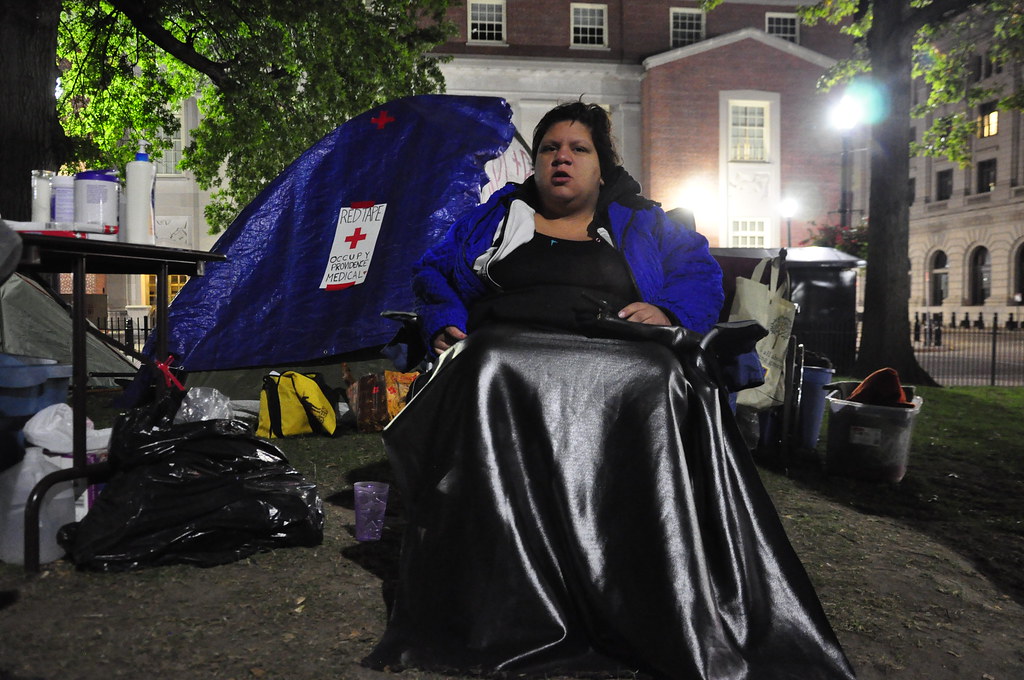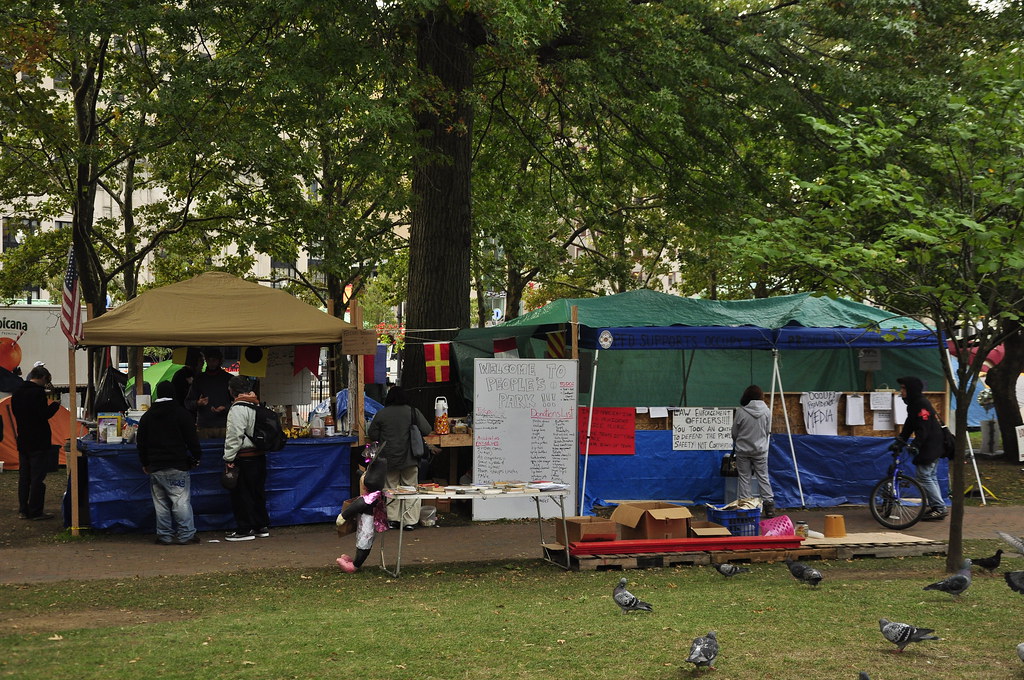My first night at Occupy Providence
19 Oct 2011 I don’t want to be blindly supportive of the Occupy movement. I don’t want to blindly condemn it. I don’t want to be blind at all. In a movement as experiential as this one, joining in is the best way to learn. I’m describing myself as an embedded journalist-activist, and, while I largely support the movement’s (ethereal) goals, I’m retaining some measure of aloofness. From a journalistic perspective, this lets me critique the movement while being involved enough to feel like I’m part of a real and constructive conversation, rather than acting like a distant analyst with little connection the emotions and ideas this movement is bursting with.
I don’t want to be blindly supportive of the Occupy movement. I don’t want to blindly condemn it. I don’t want to be blind at all. In a movement as experiential as this one, joining in is the best way to learn. I’m describing myself as an embedded journalist-activist, and, while I largely support the movement’s (ethereal) goals, I’m retaining some measure of aloofness. From a journalistic perspective, this lets me critique the movement while being involved enough to feel like I’m part of a real and constructive conversation, rather than acting like a distant analyst with little connection the emotions and ideas this movement is bursting with.
My friend Noa and I arrived at Burnside Park at about 3:00 AM last (Monday) night, and after several interviews, fell asleep to the sounds of laughter and walkie-talkies, in a seven-person community tent (open to all; first come, first served). As early as 5:00 AM, cars drove by honking in support of the signs all along the fence around the park.
I’ll be staying here for the rest of the week. I’m posting now from the tent I’ve set up for myself and other Brown students. Noa took all of the pictures here, as well as more which can be found on my Flickr.
Artemis: The Red Tape Army
Artemis (known to all here as “Ma”) is coordinating the Red Tape Army, which began as a small corps of medical volunteers, and has expanded its duties to include general hospitality tasks such as distributing blankets and food. Anotherone of Artemis’ stated goals is to hug every single person who comes through the park.
 From 1999 to 2001, Artemis was homeless, living on Thayer Street on College Hill. The Finlandia co-op often provided her with food, and she also recalls sleeping on their couches regularly. From our conversation, it was readily apparent that she remains highly aware of the unique challenges the homeless face; much of her work here is in a sort of unofficial homeless-outreach capacity. She buys the homeless “kids” $1 pizza at the nearby 7-11, and has brought a lot of them into Occupy Providence by helping them out in this way. Her compassion for the many homeless who were already living in Burnside Park when Occupy came in, as well as for those who’ve joined after, is readily apparent. She told me of a homeless man whom she helped out one night; he returned the next day to tell her “Because of you, I didn’t commit suicide.” She says “That’s what it’s about – I don’t care about the political end.”
From 1999 to 2001, Artemis was homeless, living on Thayer Street on College Hill. The Finlandia co-op often provided her with food, and she also recalls sleeping on their couches regularly. From our conversation, it was readily apparent that she remains highly aware of the unique challenges the homeless face; much of her work here is in a sort of unofficial homeless-outreach capacity. She buys the homeless “kids” $1 pizza at the nearby 7-11, and has brought a lot of them into Occupy Providence by helping them out in this way. Her compassion for the many homeless who were already living in Burnside Park when Occupy came in, as well as for those who’ve joined after, is readily apparent. She told me of a homeless man whom she helped out one night; he returned the next day to tell her “Because of you, I didn’t commit suicide.” She says “That’s what it’s about – I don’t care about the political end.”
It would be easy to decry the members of the Providence homeless community as free-riders; they’re benefiting from the donated tents, blankets, and food and drink that Occupy is collecting and distributing. However, the Occupiers consistently show an impressive amount of camaraderie with the homeless, who otherwise remain invisible to society in many ways. This kind of solidarity through cohabitation anddirect action is a testament to Occupy’s willingness to live out its principles of inclusion.
In yet another display of the pragmatism I’m discovering in all corners of Occupy, Artemis fully understands that we’re in a tenuous situation here. Of the future of Occupy Providence’s physical presence, she remarked “The cops have been great, but we’re pushing it now.”
Felicia: “We need to be heard.”

Felicia is a member of the Red Tape Army. She was working the 2-8 shift when I talked with her outside the main medical tent. She’s in business school, and got involved in Occupy on Saturday night. She came back after church on Sunday, and has been here ever since. I started to ask her about some of her reasons for being here, but was interrupted by a squawk from her walkie-talkie; all the medical volunteers carry one. Once she confirmed that she wasn’t needed, we continued. “I can’t really pick one thing,” she responded when I named a few of the reasons others had given for their involvement. “We need to be heard.”
Felicia, too, underscored the message of respect for the police. “If it wasn’t for them, we wouldn’t be here.” She also spoke about respecting the park and keeping it clean. I asked her about next steps – she wants Occupy to start talking to politicians, joining and organizing rallies at the statehouse and City Hall – to be heard everywhere possible.
Going forward, a focus on visibility of the kind Felicia expressed will be vital. If Occupy doesn’t continue to expand into new areas, to bring in new attention, energy, and ideas, it will stagnate. To really be heard, we need to constantly look for new ways to express ourselves.
Dave Taveres: “I am a capitalist, but at the same time, that doesn’t give you the right to take advantage of people.”

I stopped Dave as he walked along the edge of Burnside Park, observing the signs and the tents clustered inside. He works in Pawtucket (he described his job as “blue-collar”), and has seen Occupy’s presence here when he takes the bus at Kennedy Plaza next to the park. He’s worked a lot with the homeless in the past, and agrees with Occupy’s messages of opposition to corporate greed – he feels that the government doesn’t care about this problem.
His quote above is reflective of a lot of the sentiment I’m picking up here. Many Occupiers communicate a genuine sense of betrayal – they really feel that they’ve worked hard and that society has failed to recognize and reward them for it. Occupy is far from the only movement to hold this sentiment, but it’s a powerful one.
Annie: “These things take time.”
Annie has been homeless for the past 3 months, and declined to have her picture taken. She became closer to Occupy last night, through Artemis. She doesn’t know many of the Occupiers or the other homeless, and rightly observed that Occupy Providence is “a fledgling group. It takes time. These things take time.”
The homeless community seems to be a much bigger part of Occupy here than they do elsewhere. I was particularly interested in hearing more about what they need from the movement. Annie said that she could use help finding housing, but she acknowledged that Occupy has a lot of other priorities as well; “the peace movement, and social justice.”
“Winds of change. Winds of change going on,” she told me. “I think a good socialist movement is necessary here in RI and throughout the country – it’s time for change. It’s a movement whose time has come.”